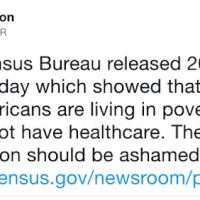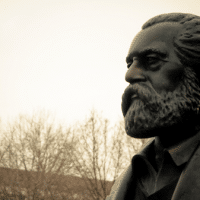-
A sound ecological policy cannot be achieved within a capitalist framework
“Ecosocialist politics is based on recognizing that a sound ecological policy cannot be achieved within a capitalist framework. In order to restore (to the extent possible) the health of the ecosphere, it is necessary that economic decisions be no longer based on the capitalist goals of maximizing profit and accumulating wealth.”
-
After win by Brazilian fascist Jair Bolsonaro, world’s capitalists salivate over ‘new investment opportunities’
“Capitalism only asks whether fascism is profitable.”
-
The crisis of capital
It may be hard, but I want you to try to think back a decade, actually slightly less than a decade. In 2000, we were celebrating the millennium, and if you remember what was happening at that time, it was an enormous celebration of a new global capitalism, of globalization, of the end of conflict in the world, of a new world order.
-
Trump, or capital in the Oval Office
The moment was of course metaphysically necessary—that capital incarnate itself as man and come among us. The question we must ask rather is how this descent occurs, for that determines all that follows.
-
Twenty-first century capitalism—the means exist to break the chains that hold us
“The overwhelming character of the ecological crisis will eventually…[force workers to recognize] that the main material conditions determining their lives are both economic and environmental—and indeed that the latter are more far-reaching.”
-
Socialism frightens Trump White House, publishes ‘red scare’ just before midterm elections
The White House’s Council of Economic Advisers (CEA) released a report earlier this week on “The Opportunity Costs of Socialism,” apparently based on the fact that “coincident with the 200th anniversary of Karl Marx’s birth, socialism is making a comeback in American political discourse,” even though Marx’s birth was in May (1818).
-
Brazil Elections: a conversation with social leader Frei Betto
The second round of elections in Brazil will take place Oct. 28, and this time two opponents will face off. On the one side is Fernando Haddad from the Workers’ Party (PT) who promises to continue the project started by Luiz Inacio Lula da Silva and Dilma Rousseff.
-
The most potent weapon in the hands of the oppressor is the mind of the oppressed
Mike Peters explores the legacy of Steve Biko, a radical who spent his life fighting for Black liberation and for the overthrow of the Apartheid government in South Africa.
-
Yes, ExxonMobil and Chevron are still distorting climate science
If you look at headlines from the last year, ExxonMobil, Chevron and other major fossil fuel companies have seemingly turned a new page on climate change.
-
Trump and Bolton’s new motto: how I started to stop worrying and love the bomb
The key issue is the U.S.’s desire to return to the 90’s status of the world’s sole hegemon.
-
Costas Lapavitsas: socialism starts at home
“We have relations of domination, new ways in which imperialism manifests itself. That’s the reality of Europe, not the fairy stories of an alliance of nations, overcoming national borders, becoming one big, happy family.”
-
Sciences of inequality
Last month, Philip Alston, the United Nations Special Rapporteur on extreme poverty and human rights (whose important work I have written about before), issued a tweet about the new poverty and healthcare numbers in the United States along with a challenge to the administration of Donald Trump (which in June decided to voluntarily remove itself from membership in the United Nations Human Rights Council after Alston issued a report on his 2017 mission to the United States).
-
Women workers bring Glasgow to a standstill
Council staff make history with biggest strike over equal pay.
-
Privatisation harms poor and needy, says UN poverty expert
Widespread privatisation of public goods in many societies is systematically eliminating human rights protections and further marginalising those living in poverty, according to a hard-hitting new report. The report was transmitted to the UN General Assembly on 19 October.
-
Bolsonaro’s son threatens violence if his father is blocked from Brazil’s presidential race
FAR-RIGHT Brazilian presidential candidate Jair Bolsonaro’s son has threatened violence against the country’s Supreme Electoral Court (TSE) if it blocks his father from running in Sunday’s second-round poll.
-
Trump Says U.S. to exit nuclear treaty, Russia vows retaliation
Trump said the United States will develop the weapons unless Russia and China agree to a halt on development.
-
Deadly, cowardly U.S. drone wars in Africa
War is romantic only when it is limited to the confines of a sanitized imagination. Movies that portray heroic soldiers vanquishing demonic enemy combatants or rescuing fallen comrades may whip up jingoistic war fever, but horrific images of real children and elders maimed, scarred, dismembered and killed during armed conflicts have the power to end wars.
-
Intersectionality: A Marxist Critique
Intersectionality, a way of thinking about the nature and causes of social inequality, proposes that the effects of multiple forms of oppression are cumulative and, as the term suggests, interwoven.
-
Marx at 200
“Proletarians [Proletarier] of all countries, unite!” It is with these ringing words that Karl Marx and Friedrich Engels famously conclude their Communist Manifesto in 1848 (MECW 6: 519; MEW 4: 493, sometimes my translation).
-
A Marxist History of Capitalism
An important work of Marxist history and theory restores class struggle to central place in explaining how capitalism arose and grew, and can eventually be overcome.




















